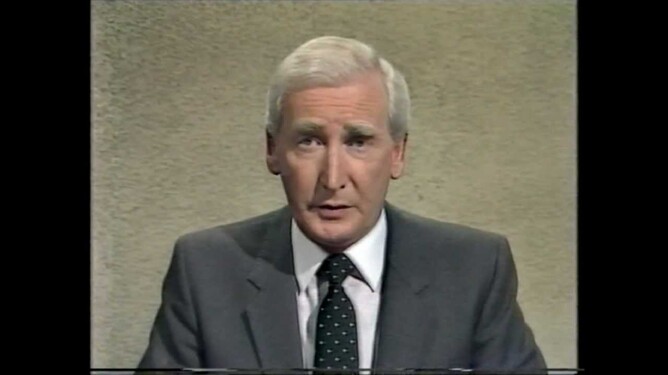By Luke Henshall
Remember Philip Sherry? New Zealand's great white duke of tv news presenting. He was great wasn't he. A dapper chap with excellent elocution. A symbol of an era when the evening news was the place where you got your wrap up of news for the day and you could feel like you were as informed as the next man (or woman) about the world. Nowadays in the digital landscape we live in, by the time you get to the evening, you're already well versed in the majority of the big news of the day and chances are you're also up to speed with whatever is trending on social that day as well.
Which brings me to the big question that has got a bit of airtime this week, in this era of information overload, where does traditional news gathering sit? And when I say that, I'm talking about a reporter who actually goes out into the world, interviews various people and sources facts. Because the fact is, news costs money, lots of money to do right – Paula Penfold styles. This exact question was on the agenda at a media mingle event this week and the audience was treated to some inspiring and depressing views by some of the media heavyweights depending on who were speaking. Yes, it's no secret that in a world where two of the biggest sources for digital news in New Zealand, NZ Herald and Stuff are measured against readership in the form of clicks, click bait is always going to trump traditional news reporting. And this was reinforced the other night which the speakers were more or less confessing that the model is broken. But is the answer really to merge the sites and the media companies' operations in New Zealand altogether? http://www.nzherald.co.nz/business/news/article.cfm?c_id=3&objectid=11698614 (as an aside... nice to see the impact of the decision is considered significant enough for the Commerce Commission to call for another seven months to make it).
A view large voiced on Monday evening which I agree with is that no, while it might not be technically defined as a monopoly move, it is a monopolising of news content. As much as the submissions to the Comm Comm advocating the merger would suggest otherwise, I personally would never go to Facebook or Google for my news needs. As Guyon Espiner alluded to in a rallying cry of sorts, society needs a proliferation of news channels to encourage competition and maintain the integrity and role of the "fourth estate" to keep "the man" honest. For us communications practitioners, we also have a vested interest as a core part of our function is to help find the stories within and around organisations and tell them to a variety of audiences. The fewer channels and means to do this is not ideal. Saying that, it is far from being a major setback as it will only mean more and more organisations filling the void and beefing up their digital content or even creating their own news channels such has already happened with a number of large corporates such as Auckland Council and some of the big banks.
Coming back to the key point, though, where and how does news reporting get funded when it seems the big offshore owned media organisations are more interested in activating our fingers and thumbs in the form of clicks than our brains. Which you could argue from a commercial point of view is only fair and perhaps the mourning of "the quality of journalism in this country" is really just a self-indulgent lament by the middle class and liberal elite who actually give two sods about it. Cue the John Campbell versus Mark Weldon debate that led to the demise of Campbell Live last year.
This leads me to a way forward which is not new and was indeed bandied around the other night. The user pays model. I'm thinking less paywalls and more crowdfunded investigative journalism. We got a taste of that recently with the Spinoff's campaign of stories on housing and the Unitary Plan. It is a tricky one though as more often than not if you are about to start investigating a story, or issue, the last thing you want to do is advertise to the key protagonists or alleged bad guys in the piece that you're coming for them, which is part and parcel of marketing for crowdfunding campaigns. But surely (or should I say Shirley or perhaps even Sherry) there's got to be a way forward there somewhere?? As otherwise, I'll just have to resort to a cardboard cut-out of Philip Sherry to make me feel like we're still in an era of news of substance and effective societal critique.
Which brings me to the big question that has got a bit of airtime this week, in this era of information overload, where does traditional news gathering sit? And when I say that, I'm talking about a reporter who actually goes out into the world, interviews various people and sources facts. Because the fact is, news costs money, lots of money to do right – Paula Penfold styles. This exact question was on the agenda at a media mingle event this week and the audience was treated to some inspiring and depressing views by some of the media heavyweights depending on who were speaking. Yes, it's no secret that in a world where two of the biggest sources for digital news in New Zealand, NZ Herald and Stuff are measured against readership in the form of clicks, click bait is always going to trump traditional news reporting. And this was reinforced the other night which the speakers were more or less confessing that the model is broken. But is the answer really to merge the sites and the media companies' operations in New Zealand altogether? http://www.nzherald.co.nz/business/news/article.cfm?c_id=3&objectid=11698614 (as an aside... nice to see the impact of the decision is considered significant enough for the Commerce Commission to call for another seven months to make it).
A view large voiced on Monday evening which I agree with is that no, while it might not be technically defined as a monopoly move, it is a monopolising of news content. As much as the submissions to the Comm Comm advocating the merger would suggest otherwise, I personally would never go to Facebook or Google for my news needs. As Guyon Espiner alluded to in a rallying cry of sorts, society needs a proliferation of news channels to encourage competition and maintain the integrity and role of the "fourth estate" to keep "the man" honest. For us communications practitioners, we also have a vested interest as a core part of our function is to help find the stories within and around organisations and tell them to a variety of audiences. The fewer channels and means to do this is not ideal. Saying that, it is far from being a major setback as it will only mean more and more organisations filling the void and beefing up their digital content or even creating their own news channels such has already happened with a number of large corporates such as Auckland Council and some of the big banks.
Coming back to the key point, though, where and how does news reporting get funded when it seems the big offshore owned media organisations are more interested in activating our fingers and thumbs in the form of clicks than our brains. Which you could argue from a commercial point of view is only fair and perhaps the mourning of "the quality of journalism in this country" is really just a self-indulgent lament by the middle class and liberal elite who actually give two sods about it. Cue the John Campbell versus Mark Weldon debate that led to the demise of Campbell Live last year.
This leads me to a way forward which is not new and was indeed bandied around the other night. The user pays model. I'm thinking less paywalls and more crowdfunded investigative journalism. We got a taste of that recently with the Spinoff's campaign of stories on housing and the Unitary Plan. It is a tricky one though as more often than not if you are about to start investigating a story, or issue, the last thing you want to do is advertise to the key protagonists or alleged bad guys in the piece that you're coming for them, which is part and parcel of marketing for crowdfunding campaigns. But surely (or should I say Shirley or perhaps even Sherry) there's got to be a way forward there somewhere?? As otherwise, I'll just have to resort to a cardboard cut-out of Philip Sherry to make me feel like we're still in an era of news of substance and effective societal critique.

